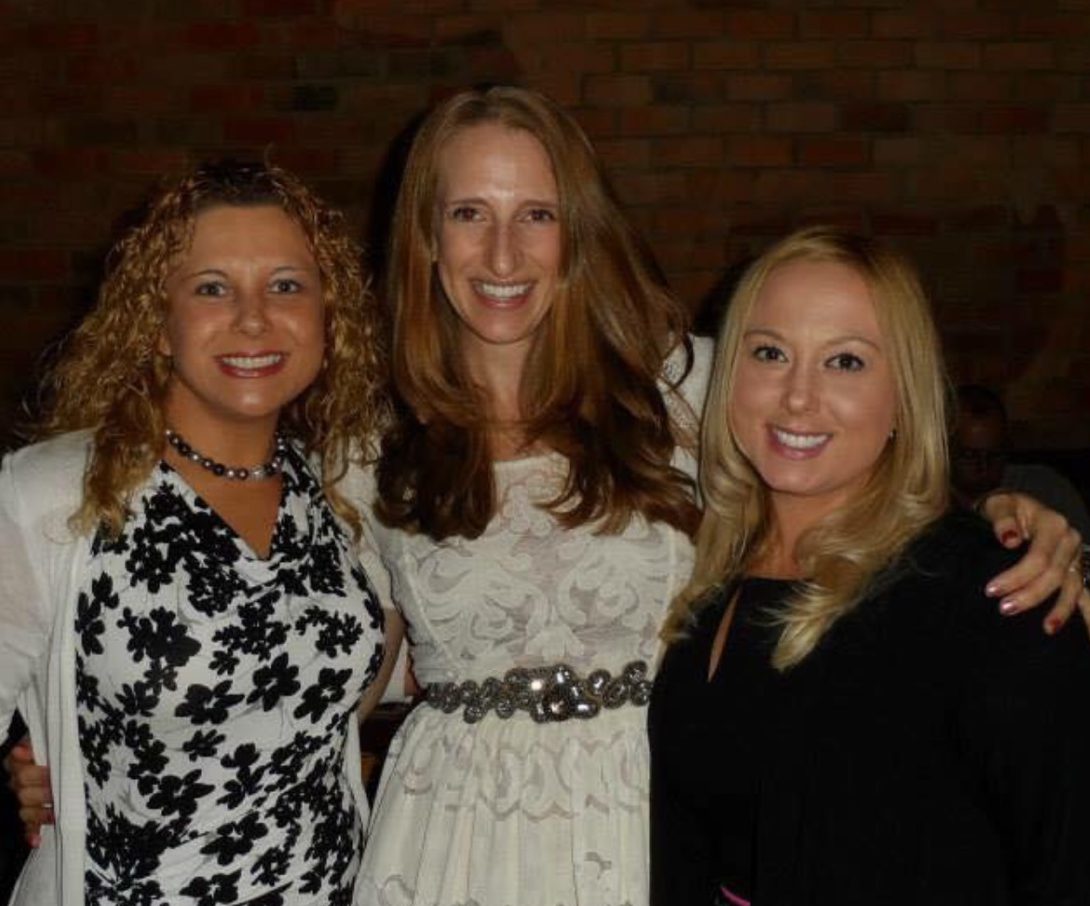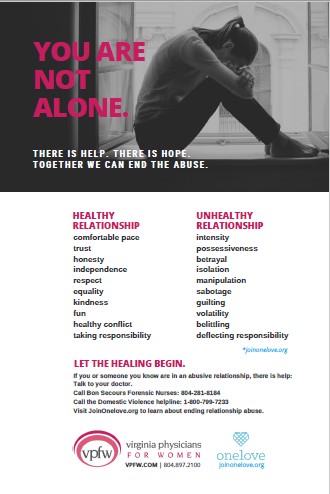“On average, it takes a woman 7 attempts to leave an abusive relationship for good.” Jane Clayborne, director of community relations at The James House shelter for victims of domestic violence, came to speak to the doctors, nurses and staff of our Prince George Office during Domestic Violence Awareness Month in October. She shared some insights on what it takes for women to leave – and the many reasons that hold them back.
Fear of what happens after leaving
The main reason women don’t leave is fear – fear that they have nowhere to go and no one to turn to for help and resources. Oftentimes their partner has isolated them from their friends and family whom they would normally look to for support. Sometimes abusive partners interfere with a woman’s job – limiting her ability to make a living or even convincing or forcing her to quit. This makes the woman feel financially dependent on the abuser and trapped in the relationship.
Women are often fearful of the effects that leaving would have on their children – abruptly taking them out of school, removing them from financial stability, etc. They also don’t want to face the difficult questions their children might ask.
One of the most common reasons holding women back is their pets – fear of subjecting their animals to further abuse if they are not able to take them to a women’s shelter or other place of refuge. Shelters like the James House in Prince George/Colonial Heights and Safe Harbor in metro Richmond can help women make a plan to leave and offer resources like gift cards for groceries and gas in addition to a place to stay while they get back on their feet.
Shame of compromising a positive “couple” image
Oftentimes, the reason women don’t leave abusive relationships is not so much fear, but shame. As we learned in One Love’s “Behind the Post” workshop at ACAC earlier this month, victims (especially younger generations) often want to appear that they have a picturesque relationship, posting photos that garner likes and comments like “couple goals!” on social media. As the relationship becomes abusive, they may not see a way out without compromising their image. Victims might want to reach out and tell a friend what they are going through but are too embarrassed to start the conversation.

Dr. Cara Hartle, OB/GYN at VPFW, knows the heartbreak of abusive relationships that, on the surface, appear healthy to friends and family. Just last year, one of her best friends, at 34 weeks pregnant, was shot and killed by her fiancé in the apartment they shared in Pennsylvania. Dr. Hartle recently told her story at the Domestic Violence and Fair Housing Law Forum. (Fair Housing Training Specialist Mahalia Drysden-Mason, who also happens to be a VPFW patient, had seen Dr. Hartle’s blog post, “My friend, Mikie,” and invited her to speak at the event.)
Dr. Hartle shared that Mikie’s baby shower was just days before she was killed, and she seemed to be doing well. As a matter of fact, Mikie was her normal bubbly self, talking and laughing with family and friends. She was enjoying the ups and downs of pregnancy and was anxiously awaiting the arrival of her baby boy, Logan. She had a wonderful support system that she could have turned to, yet she never mentioned anything troubling about her relationship. Dr. Hartle was devastated that her friend wasn’t able to talk to her about the abuse before it was too late.
Never hesitate to ask a friend if they are okay
“Women who are experiencing shame and despair must be given hope and a way out,” Dr. Hartle said. She encourages women to never hesitate to ask someone close to them if they are okay, even if they seem to be fine. “We have to be comfortable asking the question.”
One Love has some great advice for helping a friend you suspect may be in an abusive relationship, from ways to start the conversation (ask if their partner is supportive rather than using the word “abuse”) to ways to offer a solution.
Doctors care and are here to help
Dr. Hartle also reminds women that their doctor’s appointments should always be a safe place to open up and tell their story. At VPFW, we discretely ask patients if they feel safe in their relationship. If not, we arrange a way for them to have a private conversation with their doctor – even when their abusive partner comes with them to all of their appointments. VPFW can offer resources for women and help them figure out what’s best for their family.
10 Signs of Healthy and Unhealthy Relationships

The signs of domestic abuse can be difficult to recognize by family and friends when the victim is trying her hardest to appear “fine.” Sometimes, even the victim herself might not recognize abusive behavior in her relationship. She may not know what a healthy relationship looks like and might assume that abusive behavior is just part of normal relationship struggles. In fact, abusive behavior can seem very loving, especially at first. But that “love” is often controlling behavior meant to manipulate or isolate a victim. This unhealthy behavior is usually a sign of current or future abuse.
At One Love’s workshop, we explored 10 signs of a healthy relationship vs. those of unhealthy relationship. We created posters displaying these signs to educate both victims and friends and family members of someone who might be in an abusive relationship.
10 Signs of a Healthy relationship:
comfortable pace
trust
honesty
independence
respect
equality
kindness
fun
healthy conflict
taking responsibility
10 Signs of an Unhealthy Relationship:
intensity
possessiveness
manipulation
isolation
sabotage
belittling
guilting
volatility
betrayal
deflecting responsibility
Resources for help
The posters also list the following resources for help:
Talk to your doctor.
Call Bon Secours Forensic Nurses: 804-281-8184. The nurses care for victims of domestic violence, sexual violence and child abuse.
Call the Domestic Violence helpline: 1-800-799-7233.
Visit JoinOnelove.org to learn about ending relationship abuse.
We have placed these signs in the bathrooms at VPFW because oftentimes the bathroom is the only place a woman in an abusive relationship is alone and can seek resources. We would love for other establishments to follow suit. If you’d like a copy of our poster to hang in the ladies room of your place of business, please email info@vpfw.com.
Empower each other
We hope you’ll continue this conversation about healthy and unhealthy relationships with your daughters, your mothers, your friends, etc. Educate each other to recognize unhealthy relationships, share resources, and give each other the strength to leave. It could save their lives, or your own.
To schedule an appointment with a VPFW provider, you can call us at 804-897-2100 or set an appointment online.